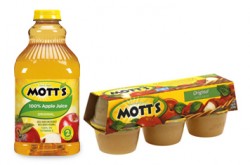Top Class Actions’s website and social media posts use affiliate links. If you make a purchase using such links, we may receive a commission, but it will not result in any additional charges to you. Please review our Affiliate Link Disclosure for more information.

The lead plaintiff in the Mott’s class action lawsuit, Mohammed Rahman, alleged in his June 2013 lawsuit that Mott’s had failed to comply with U.S. FDA regulations for “No Sugar Added” labeling. Rahman alleged that Mott’s use of the “No Sugar Added” claim on various Mott’s applesauce, juice and other food products violated FDA regulations 21 C.F.R § 101.60(c)(2), California’s Sherman Law, and California Health and Safety Codes, and that he would not have purchased Mott’s products had they not been labeled “No Sugar Added.”
Rahman argued that Mott’s use of concentrated fruit juice in these products disqualifies Mott’s from using the “No Sugar Added” label and that Mott’s failed to disclose that these products were not low-calorie foods as required by the FDA. Mott’s moved to dismiss the mislabeling class action lawsuit several times and Rahman had amended his original allegations several times.
In a ruling issued Jan. 30, U.S. District Judge Susan Illston granted all of Mott’s most recent motion to dismiss, except for the allegation that Mott’s 100% Apple Juice is mislabeled as “No Sugar Added.”
Judge Illston noted that there is an exception to the FDA regulations that Rahman alleges Mott’s violated. The FDA provides for an exception to the “No Sugar Added” labeling requirements if concentrated fruit juice was not added to the product for the purpose of increasing its sugar content. Judge Illston determined that Mott’s use of the “No Sugar Added” label on their applesauce fell under that exception, but Mott’s 100% Apple Juice did not.
Judge Illston also dismissed the allegation that Mott’s failed to disclose that the products where not low calorie because Rahman failed to show that the products didn’t qualify as low-calorie or reduced-calorie food.
“In order to use the term ‘No Sugar Added,’ [FDA regulations] require that a statement that the food is not ‘low calorie’ or ‘calorie reduced’ unless the food meets requirements for a ‘low’ or ‘reduced calorie’ food. The term ‘reduced calorie’ may be used if the food contains at least 25 percent fewer calories per reference amount customarily consumed than an appropriate reference food as described in [the FDA regulations],” Judge Illston noted in her decision
Rahman argued that the Mott’s applesauce and juice products do not qualify as “low” or “reduced calorie” because they have a similar caloric content as reference food. The judge noted that the FDA regulations consider a food “reduced calorie” if the food contains 25 percent fewer calories per reference amount than an appropriate reference food, and “[t]herefore, there are three avenues for a particular food to be considered ‘reduced calorie.’… Plaintiff’s allegations only address one of the three avenues.”
Further, the judge dismissed Rahman’s claims brought under California’s negligent misrepresentation law, that Mott’s fraudulently labeled the food products and Rahman relied on the fraudulent labeling. Although the judge did not dismiss the claim, she precluded Rahman’s ability to recover damages under California’s breach of quasi-contract theory.
Judge Illston did not dismiss Rahman’s claims regarding Mott’s 100% Apple Juice. The judge pointed out that in order to use the term “No Sugar Added” the FDA requires that the product resembles and substitutes for a food that normally contains added sugars and apple juice does not normally contain added sugar.
The plaintiff is represented by Jordan L. Lurie, David L Cheng, Sue J Kim, Sharon G. Yaacobi and Arvin Ratanavongse of Capstone Law APC.
The Mott’s ‘No Sugar Added’ Class Action Lawsuit is Rahman v. Mott’s LLP, Case No. 3:13-cv-03482, in the U.S. District Court for the Northern District of California.
UPDATE: The plaintiff’s amended complaint passed muster with the judge, who denied Mott’s second motion to dismiss the class action lawsuit.
ATTORNEY ADVERTISING
Top Class Actions is a Proud Member of the American Bar Association
LEGAL INFORMATION IS NOT LEGAL ADVICE
Top Class Actions Legal Statement
©2008 – 2024 Top Class Actions® LLC
Various Trademarks held by their respective owners
This website is not intended for viewing or usage by European Union citizens.















7 thoughts onMott’s ‘No Sugar Added’ Applesauce, Juice Class Action Lawsuit Trimmed
Add me
UPDATE: The plaintiff’s amended complaint passed muster with the judge, who denied Mott’s second motion to dismiss the class action lawsuit. More info: http://topclassactions.com/lawsuit-settlements/lawsuit-news/23412-motts-class-action-lawsuit-to-proceed/
I would like to be involved in this lawsuit, please contact me.
How do I file a claim against Motts ?
How do I file a class action about Mott’s?
How can i file a claim?
How do I file a class action about Mott’s?